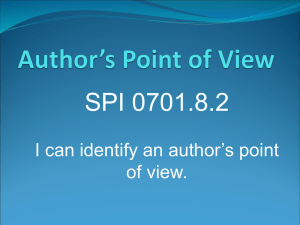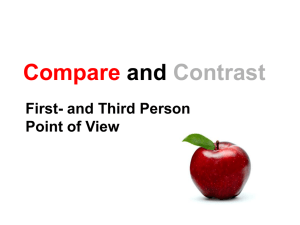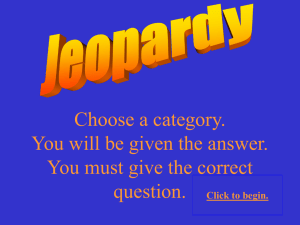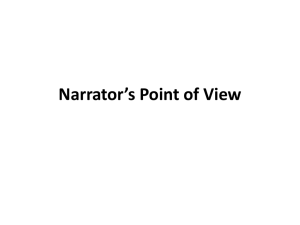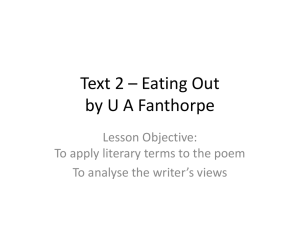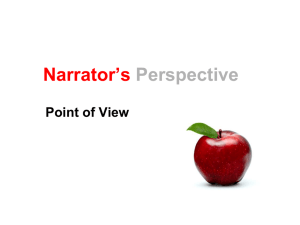091012 Narratology
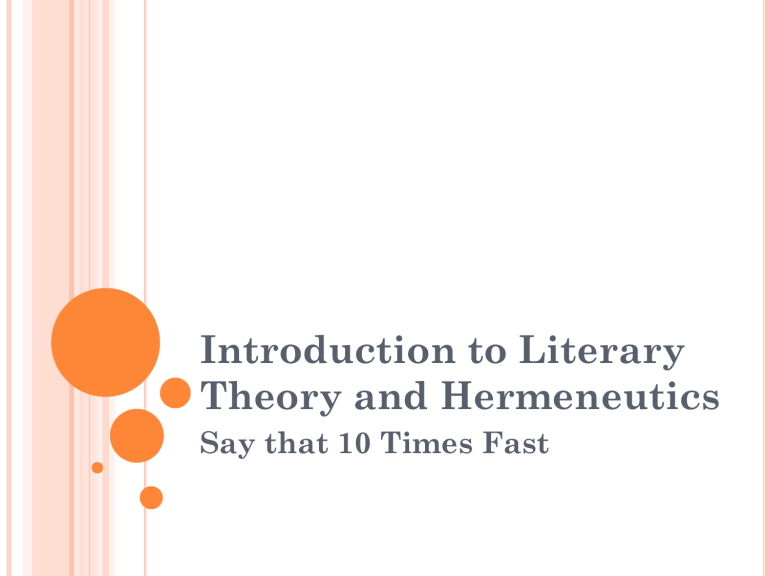
Introduction to Literary
Theory and Hermeneutics
Say that 10 Times Fast
W
HAT IS
T
HEORY
Something typically from which practice is derived.
Often a purely speculative undertaking.
Hypothesis about something, the exact nature of which one needn't necessarily have in view.
Exists for the most part to be applied.
W
HAT IS
L
ITERARY
T
HEORY
Reading anything is a complex and potentially unlimited activity.
Literary theorists look to a text to understand the intersection of language, psychological, social, economic, and historical forces.
Questions a literary theorist asks:
What is literature? How can we define it?
How do we know it when we see it?
What causes literature and what are the effects of literature?
"What is an author?"
"What is a reader?"
How do we meet the text face-to-face?
How do we put ourselves in touch with the text which may after all in a variety of ways be remote from us?
T
HE
B
IRTH OF
H
ERMENEUTICS
: T
HE ART
AND PRINCIPLES OF INTERPRETATION
Interpretation has not always existed (seriously!)
The idea that there ought to be a sort of a systematic study of how we interpret things did not become popular until the 18 th century.
Why do you think this is?
Rises as a result of the Enlightenment
With the emergence of Romanticism, literary creator starts to seem a lot more like the divine creator.
Secularization in Western culture is increasing during the course of the Enlightenment causing the meaning of literature becomes more difficult because it's profoundly subjective and no longer engaged with shared religious values.
Prior to this playwrights were writing prologues to their plays abusing each other for being obscure--that is to say, abusing each other for requiring interpretation. "I don't understand what your metaphors are all about. You don't know what a metaphor is. All you do is make one verbal mistake after another. Nobody can understand you.” If you had to interpret it, it wasnt any good.
NARRATOLOGY
A Lesson in Trust
WHAT DO THE FOLLOWING
HAVE IN COMMON?
“The Salinas Valley is in Northern California.” East of Eden by John
Steinbeck (1952)
"On a January evening of the early seventies, Christine Nilsson was singing in Faust at the Academy of Music in New York.” Age of Innocence by Edith Wharton (1920)
"As Gregor Samsa awoke one morning from uneasy dreams he found himself transformed in his bed into a monstrous vermin ” Metamorphosis by Franz Kafka (1915)
"Maman died today. Or yesterday maybe, I don’t know. I got a telegram from the home: “Mother deceased. Funeral tomorrow. Faithfully yours.”
That doesn’t mean anything. Maybe it was yesterday.
” The Stranger by
Albert Camus (1942)
“The idea of eternal return is a mysterious one, and Nietzsche has often perplexed other philosophers with it: to think that everything occurs as we once experienced it, and that the recurrence itself recurs ad infinitum!
What does this mad myth signify?
” The Unbearable Lightness of Being by
Milan Kundera (1984)
”Listen: All of this happened more or less The war parts anyway are pretty much true.” Slaughterhouse Five by Kurt Vonnegut (1969)
Now, Let ’ s See if You ’ re
Thinking Like an AP Student or a Monkey Picking His Nose…
MIDDLE SCHOOL REVIEW: DEFINING
NARRATOR
The previous quotes are the first sentences from some of the most famous novels of the last two-hundred years.
They all have exactly one thing in common: they're each spoken by a narrator (by this point in your educational journey I hope you know what a narrator is).
But just in case... simply put, a narrator is the source of the information we get when we read a novel.
It's through the narrator that we come to understand the world the novel describes, the characters who live there, the events that go on there.
We, the reader, are beholden to them. We need them. And they need us.
Why does the narrator need us?
CAN THE NARRATOR BE TRUSTED?
Let us examine what a narrator does. As we we look at the list below, start thinking about our narrator from East of Eden.
Sometimes they give us the entire story.
Sometimes they hide things from us.
Sometimes they know what they can't possibly know.
Sometimes they can reach into the minds of characters, extract and then relay their thoughts.
Sometimes they're utterly in the dark and can tell us nothing.
They lie to us, they frustrate us, they put their arm around us and let us in on a joke. We are sometimes a captive audience for their philosophical tangents. They lead us to the solution or throw us off the scent.
NOW YOU BE THE JUDGE
Yes, of course! If We Can ’ t Trust the Narrator Who Can We
Trust???
No Way! I Feel So Betrayed! The
Narrator is Nothing More than an
Unreliable Gossip!
Lets start to look at a narrator as your family. You can't choose them and, for better or for worse, when you read a novel you're stuck with them.
However, the concept of narration is not as simple as it may seem
(what in literature is?). In fact, there's a whole branch of literary theory which deals with the act of narration: narratology. It's part of a larger discipline called narrative theory.
Narrative theory looks at how a narrative is put together, what tropes are a part of narrative, the philosophical underpinnings of narrative, and how readers respond to narrative.
WHAT A NARRATOR NARRATES: NARRATIVE AND
STORY
Before we get into the nitty-gritty of what a narrator does, it's helpful to define what a narrative is. A narrative is a text which tells a story. According to the Dutch literary theorist
Mieke Bal:
A narrative text is a text in which an agent or subject conveys to an addressee ('tells' the reader) a story in a particular medium, such as language, imagery, sound, buildings, or a combination thereof. A story is the content of that
text. [Mieke Bal, Narratology: Introduction to the Theory of Narrative (Toronto 2009), p. 5.]
Bal expands the definition of narrative to include a story told in any genre or art form (literature, visual art, music, architecture). What a narrative must have is a teller and a listener, a performer and an audience. According to reader response theory, a story doesn't actually exist until there's someone to tell it to.
A story is what is being told within a narrative. Think of the narrative as the form and the story as the content. For example, a novel is a form, the plot is the story.
SJUZHET [SYUU-ZHET] AND FABULA
So now that we've defined what a narrative is, what exactly is a story?
What are its constituent parts? After all, a narrator has to tell something.
For a definition of a story we turn to British literary scholar Richard
Bradford who defines a story by citing the work of the Russian theorist
Viktor Shklovsky:
Shklovsky (1917) reduced fictional structures to two opposing and interactive dimensions: sjuzhet and fabula. Fabula refers to the actuality and the chronological sequence of the events that make up a narrative; and the sjuzhet to the order, manner, and style in which they are presented in the novel in question. The fabula of Dickens's
Great Expectations (1861) concerns the experiences, in and around
London, from the early childhood to adulthood of Pip. Its sjuzhet involves the presentation of these events in Pip's first-person account
[...]. In Dickens's novel, the first-person manner of the sjuzhet has the effect of personalizing the fabula; Pip's description of Miss Havisham and of his relationship with Estella is...influenced by factors such as
his own emotion[...] his...habits and his...perspective. [Richard
Bradford, Stylistics (London 1997), p. 52.]
A narrative text contains a story. And that story is made up of a fabula and a sjuzhet.
T
HE
F
ABULA
Fabula – the raw materials of the story (such as the literal events of the and their chronological sequence).
A story must have some kind of logic, some kind of recognizable sequence and that's what a fabula provides.
In fact some theorists argue that if a story doesn't mirror human behavior in a way a reader can recognize then they won't understand it, and your story is useless.
T
HE
S
JUZHET
How is the story told? That's the sjuzhet. And this is where the narrator comes in.
The narrator gives the story its sjuzhet when they filter the events through their perspective.
So the sjuzhet encompasses all of the devices that a narrator has at their disposal when they relate the fabula to the reader.
T
HE
C
RITICAL
D
IFFERENCE
The fabula is what.
The sjuzhet is how.
Stories can have the same
fabula. They cannot have the same sjuzhet.
Can you think of two different narratives that prove this argument?
Time to Chat
Now think of East of Eden…
With the person next to you determine the fabula and sjuzhet.
Fabula:
Sjuzhet
THE NARRATOR DEFINED
(REALLY DEFINED)
TYPES OF NARRATOR: So we've defined the thing a narrator actually relates to us: the story. So now let's define the different types of narrator and what they bring to the table. It helps to review information you probably already know in some shape or form. At the most basic level there are three types of narration: first-person, second-person, and third- person.
1st person
1st person retrospective
1st person "streamof-consciousness"
2nd person 3rd person
3rd person limited omniscient
3rd omniscient
First person narration means the story is told from the point of view of a narrator who identifies themselves as "I."
Albert Camus’ narrator of The
Stranger is a firstperson narrator:
Maman died today. Or yesterday maybe, I don’t know. I got a telegram from the home: “Mother deceased. Funeral tomorrow.
Faithfully yours.”
That doesn’t mean anything. Maybe it was yesterday.”
A first-person retrospective
narrator tells a story in the present about something that happened in the past. The narrator of Harper
Lee's novel To Kill
a Mockingbird is an example:
When he was nearly 13, my brother Jem got his arm badly broken at the elbow.
This type of narrator will sometimes comment on what happened in the past with 20/20 hindsight; this type of narrator also likes to foreshadow details because they already know what happened.
A first-person stream-of- consciousness narrator tells the reader the story of the novel but does so in a way that mimics their thought patterns. The narrator of Kundera’s The
Unbearable Lightness of
Being, at times, demonstrates first-person stream-of-consciousness:
The idea of eternal return is a mysterious one, and Nietzsche has often perplexed other philosophers with it: to think that everything occurs as we once experienced it, and that the recurrence itself recurs ad infinitum! What does this mad myth signify?
We, the reader, are privy to the narrator's thoughts as they occur to the narrator.
In this case the stream-ofconsciousness is meant to give us a feel for how a philosopher thinks. There is no filter in this type of narration; imagine getting into the head of the narrator and that's what stream-of-consciousness narration is. As you can imagine, this can make figuring out the story difficult and it often gives you a more limited perspective on what's happening.
When a narrator tells us a story in the first-person, that story isn't necessarily about them.
The unnamed first-person narrator who opens Joseph
Conrad's Heart of Darkness ends up having nothing to do with the events of the novel. In fact, he doesn't know anything.
He quotes another character's story once they meet up. A first-person narrator is often limited in what they know. An example is the narrator of
Steinbeck’s novel east of Eden who tries to piece together the story of the Hamilton and Trask families:
I must depend on hearsay, on old photographs, on stories told and on memories which are hazy and mixed with fable in trying to tell you about the Hamiltons.
As you'll see, a first-person narrator can often be no more enlightening than any other kind with the added complication that they usually have some sort of agenda and aren't always reliable.
Second-person narrators are rare. They refer directly to another character or the read using "you." This type of narration may happen in the course of a novel from time to time, but it's extremely difficult to sustain for an entire novel. A second-person narrator directly addresses a character. Be careful: that character may not necessarily be you, the reader
(though it might). Just because a narrator uses the word "you" doesn't make it second person narration. Here's a clue, if the narrator at any point uses "I" then it's not second person (so "I can't believe you did that" is not second person narration).
Second person imperative narration is even more rare in fiction but common in business letters and instructional manuals. It's the narrative voice that commands or suggests. An example: "You should always keep the surge protector clear of areas where water accumulates." However, there is a literary example. The opening line of Kurt Vonnegut’s novel Slaughterhouse Five is an example of second-person imperative narration:
Listen: All of this happened more or less The war parts
anyway are pretty much true.
Here the "you" is implied (he could have written "You listenl" but standard practice dictates we drop the "you" from such commands).
THIRD-PERSON NARRATION ("S/HE")
A third-person narrator tells a story referring to the protagonist as "she" or "he."
This type of narrator plays no role in the story they're telling.
They are an outsider looking in, though you'll find that the third-person narrator is not necessarily a disinterested or neutral presence.
As with 1 st person, there are different types of this narrator.
A third-person
omniscient narrator knows absolutely everything, most importantly the thoughts and motivations of the characters involved
(most often the protagonist). They have access to any information they might need to tell the story. Edith
Wharton’s was famous for using this type of narrator, and she even coyly hints at her narrator's allknowingness in the first line from Age of
Innocence:
On a January evening of the early seventies,
Christine Nilsson was singing in Faust at the
Academy of Music in
New York.
That sense of the universal is central to omniscient narration; a third-person omniscient narrator has a universal grasp of the world they're relating to us, the reader.
THIRD-PERSON LIMITED
NARRATOR…
…knows a lot, but doesn't have quite the level of universal knowledge of the third-person omniscient variety. They are generally bound by what the protagonist knows and feels. An example of this text is Ernest Hemingway’s, The Old Man and the Sea.
RELIABLE VS. UNRELIABLE
NARRATOR
You'll find that most narrators have some kind of agenda (selfish or otherwise) or some kind of philosophical point to make.
This idea is an obvious one when the narrator is the first-person variety, since they often have a stake, if not an active role, in the story they're telling.
Not every first-person narrator is unreliable but very few are completely objective in how they tell the story.
Third-person narrators, by contrast, are thought to be objective. This is not always true and as a result the third-person narrator is often the toughest to categorize as their biases (where they exist) are much more subtle.
With a buddy, discuss three reasons that the narrator in EOE is reliable and three reasons that the narrator is unreliable. Use specific evidence.
A
DVANCED
N
ARRATOLOGY
There's an incredible wealth of theories about the role of the narrator in a novel.
We're going to dive a bit deeper into some theories of narration, starting with further categorizing the different types of narrators.
Our first category is based on how involved in the story a narrator is.
According to the French literary theorist Gerard Genette (one of the most quoted authorities on narratology) a narrator is diegetic. The term comes from the Greek
diegesis, which Plato used to refer to the story constructed by a narrator. So a narrator is diegetic—meaning they construct the story they tell.
The diegetic narrator:
the one who takes the time to construct the story they tell us.
shapes how they tell us the story chooses how to say what they say decides what to include or leave out.
T
HREE TYPES OF DIEGETIC NARRATORS
A homodiegetic narrator is present in the story they're telling, but not the protagonist.
Slaughterhouse Five, The Unbearable Lightness of Being
A heterodiegetic narrator absent from story they're telling.
Lets hear it for tween fiction! Twilight, Enders Game, Age of Innocence (not tween fiction), Metamorphosis
“ A homodiegetic narrator always tells a story of personal experience, whereas a heterodiegetic narrator tells a story about other people's experiences.
”
An autodiegetic narrator tells their own story in which they're the protagonist. They use the first-person. Richard Bradford sums it up nicely: The exemplary autodiegetic narrator uses the first-person pronoun
["I"] and tells the story as an element of his/her own experience.” Richard
Bradford, Stylistics (London 1997), p. 59.
o
To Kill a Mockingbird, Catcher in the Rye, The Stranger
So, now that you know all about narrators, how would you classify the narrator in East of Eden? DO NOT RAISE YOUR HAND. This is where your assignment begins.
W HY YOUR N ARRATOR IS AN A ** HOLE
“I must depend on hearsay, on old photographs, on stories told and on memories which are hazy and mixed with fable in trying to tell you about the Hamiltons. They were not eminent people, and there are few records concerning them except for the usual papers on birth, marriage, land ownership and death.” ( Ch. 2, pg. 1)
“I believe there are monsters born in the world to human parents.” (Ch. 8, pg. 1)
When two events having something in common, in their nature or in time or place, we leap happily to the conclusion that they are similar and from this tendency we create magics and store them for re-telling.” (Ch. 7, pg. 6)
“Cathy’s lies were never innocent. Their purpose was to escape punishment, or work, or responsibility, and they were used for profit.” (ch. 8, pg. 3)
Chapter 13, parts 1, 2 and 3
“When I said Cathy was a monster it seemed to me that it was so. Now I have bent close with a glass over the small print of her and reread the footnotes, and I wonder if it was true. The trouble is that since we cannot know what she wanted, we will never know whether or not she got it…it is easy to say she was bad, but there is little meaning unless we know why.” (ch. 17, pg. 1)
“…Tom always took to much on his plate, whether it was beans or women…What set down about him will be the result of memory plus what I know to be true plus conjecture built on the combination. Who knows whether it will be correct?” (Ch. 23, pg. 4)
“There were Tom and Dessie, George and his pretty Mamie, Mollie and William J. Martin, Olive and Ernest Steinbeck, Will and his Delia.” (Ch. 23, pg. 10).
Adam walked up the wide veranda steps and rang the bell. Olive came to the door and opened it a little, while Mary and John peeked around the edges of her.” (Ch. 31, pg. 5)
“A war always comes to someone else.” (Ch. 42, pg. 1)
“…and Abra- well of Abra he made his immaculate dream and, having created her, fell in love with her.: (Ch. 47, pg. 5)




